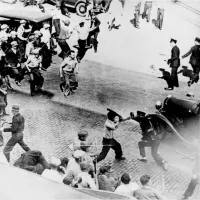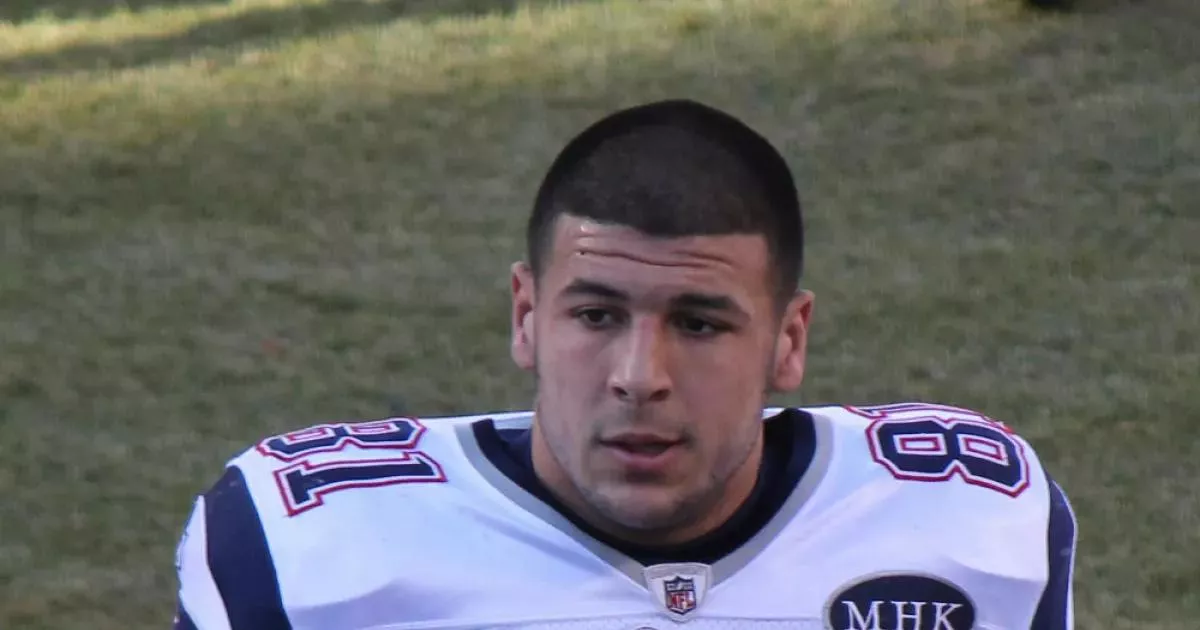Aaron Hernandez was a professional American football player, a tight end for the New England Patriots. His promising career was cut short when he was arrested and subsequently convicted for the 2013 murder of Odin Lloyd. Hernandez's case garnered significant media attention due to his celebrity status and the shocking nature of the crime. He was found guilty and sentenced to life in prison without parole. While in prison, he was also indicted but later acquitted for a separate double murder. In 2017, Hernandez committed suicide in his prison cell. Posthumous examination of his brain revealed severe chronic traumatic encephalopathy (CTE).
1960: Youngest player since 1960 to have more than 100 receiving yards
Hernandez became the youngest player since 1960 to have more than 100 receiving yards in a single game.
1984: San Diego Chargers Previous Tight End Record
In 1984, the San Diego Chargers set the previous records for receptions and yards by multiple tight ends on a single team, who used four tight ends to combine for 163 receptions and 1,927 yards, before Hernandez and Gronkowski broke those records in 2011.
1986: Parents' Marriage
In 1986, Aaron Hernandez's parents, Dennis Hernandez and Terri Valentine Hernandez, were married.
November 6, 1989: Aaron Hernandez Born
On November 6, 1989, Aaron Josef Hernandez was born in Bristol, Connecticut.
1991: Parents' Divorce
In 1991, Aaron Hernandez's parents, Dennis Hernandez and Terri Valentine Hernandez, divorced.
1996: Parents' Remarriage
In 1996, Aaron Hernandez's parents, Dennis Hernandez and Terri Valentine Hernandez, remarried.
1999: Parents' Bankruptcy
In 1999, Aaron Hernandez's parents filed for bankruptcy.
January 2006: Death of Dennis Hernandez
In January 2006, when Aaron Hernandez was 16 years old, his father, Dennis Hernandez, died from complications following hernia surgery. This event heavily impacted Hernandez.
2006: Knocked Unconscious
During one game in 2006, Aaron Hernandez took a blindside hit to the head so hard that he was knocked out cold and had to be taken off the field in an ambulance.
2006: Gostkowski signing bonus
In 2006, Memphis Tigers placekicker Stephen Gostkowski, received a signing bonus that was more than double what Hernandez received in 2010.
April 28, 2007: Hernandez Involved in Altercation at Restaurant
On April 28, 2007, a 17-year-old Aaron Hernandez consumed alcohol and assaulted a restaurant employee in Gainesville, Florida, rupturing his eardrum after refusing to pay the bill, while with Tim Tebow.
September 30, 2007: Shooting Incident in Gainesville
On September 30, 2007, a shooting occurred in Gainesville, Florida, where five shots were fired at a car containing Randall Carson, Justin Glass, and Corey Smith. Smith was shot in the head, and Glass was shot in the arm. Carson identified Hernandez in a police lineup.
2007: Started Three Games for Florida Gators
As a freshman in 2007, Aaron Hernandez started three games for the Florida Gators and finished the season with nine receptions for 151 yards and two touchdowns.
2007: Hernandez Begins Dating Shayanna Jenkins
In 2007, Aaron Hernandez began dating Shayanna Jenkins, whom he had known since elementary school.
2007: Top Tight-End Recruit
In 2007, Aaron Hernandez was considered the top tight-end recruit by Scout.com.
2007: Hernandez Initially Identified in 2007 Shooting
In 2007, Aaron Hernandez was initially identified as the shooter in a shooting in Gainesville, Florida, but the identification was later recanted, and he was not charged at the time.
2008: Starting Role after Injury
During the 2008 season, Aaron Hernandez started eleven of thirteen games in place of the injured Cornelius Ingram and finished the season with 34 receptions for 381 yards and five touchdowns.
2009: BCS National Championship Game Win
In 2009, Aaron Hernandez won the BCS National Championship Game while playing college football for the Florida Gators, earning first-team All-American honors.
2009: John Mackey Award
In 2009, as a junior, Aaron Hernandez won the John Mackey Award as the nation's best tight end after leading the team in receptions. He was also a first-team All-Southeastern Conference selection and a first-team All-American.
January 6, 2010: Declared for NFL Draft
On January 6, 2010, Aaron Hernandez announced his decision to forgo his senior year and enter the NFL draft.
March 17, 2010: Florida's Pro Day
On March 17, 2010, Aaron Hernandez participated at Florida's pro day and performed all of the combine drills.
April 27, 2010: Reported Marijuana Use
On April 27, 2010, it was reported that Aaron Hernandez admitted to scouts at the NFL Combine that he had a history of marijuana use and had failed multiple drug tests in college.
June 8, 2010: Signed by Patriots
On June 8, 2010, the Patriots signed Aaron Hernandez to a four-year, $2.37 million contract with a $200,000 signing bonus.
September 19, 2010: 101 Receiving Yards
On September 19, 2010, Aaron Hernandez had six receptions for 101 receiving yards during a loss to the New York Jets. He became the youngest player since 1960 to achieve this milestone.
November 7, 2010: First Career Touchdowns
On November 7, 2010, Aaron Hernandez caught five passes for 48 yards and scored the first two touchdowns of his NFL career during a loss to the Cleveland Browns.
December 19, 2010: Pepsi NFL Rookie of the Week
On December 19, 2010, Aaron Hernandez had four catches for 31 yards and two touchdowns in a win against the Green Bay Packers, earning him the Pepsi NFL Rookie of the Week award.
2010: Meyer's Decision
After Hernandez's junior year in 2010, Meyer told him that he would not be welcome back for a fourth year, and that he would have to try to get picked up by a professional team in the 2010 NFL draft.
2010: Randy Moss traded
In 2010, Randy Moss was traded to the Minnesota Vikings.
2010: Patriots Finished First in the AFC East
The Patriots finished the 2010 season first in the AFC East with a 14–2 record and earned a first round bye.
2010: Named Third Tight End
Throughout the 2010 training camp, Aaron Hernandez competed to be a starting tight end and was eventually named the third tight end on the Patriots depth chart.
January 16, 2011: First Career Playoff Game
On January 16, 2011, Aaron Hernandez started in his first career playoff game, catching one pass for four yards in a loss against the New York Jets.
February 21, 2011: Hip Surgery
On February 21, 2011, it was reported that Aaron Hernandez had undergone hip surgery after injuring it in Week 15.
April 30, 2011: Police Respond to Fight at Hernandez's Townhouse
On April 30, 2011, police responded to a fight in front of Aaron Hernandez's rented townhouse in Plainville, Massachusetts. Earlier, a state trooper pulled over a car with Hernandez as a passenger, going 120 mph, but did not arrest the driver because he recognized Hernandez.
December 19, 2011: Hernandez Catches Season-High
On December 19, 2011, Aaron Hernandez caught a season-high nine passes for 129 receiving yards and scored one touchdown during a 41–23 victory at the Denver Broncos in Week 15.
December 28, 2011: Hernandez Voted as Pro Bowl Alternate
On December 28, 2011, Aaron Hernandez was voted to the 2012 Pro Bowl as an alternate. Many analysts argued he was more deserving than San Diego Chargers' tight end Antonio Gates.
2011: Record-Setting Season for Hernandez and Gronkowski
In 2011, Hernandez and Gronkowski set NFL records for yardage, receptions, and touchdowns by tight ends on one team, combining for 169 receptions, 2,237 yards, and 24 touchdowns. Hernandez was considered the top H-Back in the league.
2011: Jenkins Moves In with Hernandez
In 2011, Shayanna Jenkins moved in with Aaron Hernandez during his second season with the Patriots.
January 14, 2012: Patriots Win Against Broncos in AFC Divisional Round
On January 14, 2012, Aaron Hernandez made four receptions for 55-yards and one touchdown in the Patriots' 45–10 win against the Broncos in the AFC Divisional Round. Hernandez also had a 42-yard carry.
February 5, 2012: Hernandez Starts in Super Bowl XLVI
On February 5, 2012, Aaron Hernandez started in Super Bowl XLVI and caught eight passes for 67-yards and made a 12-yard touchdown reception; however, the Patriots lost to the New York Giants 21–17.
July 16, 2012: Double Homicide Near Cure Lounge
On July 16, 2012, Daniel Jorge Correia de Abreu and Safiro Teixeira Furtado were killed by gunshots fired into their vehicle near the Cure Lounge in Boston's South End. Aaron Hernandez was investigated in connection with the double homicide.
August 27, 2012: Patriots Sign Hernandez to Contract Extension
On August 27, 2012, the Patriots signed Aaron Hernandez to a five-year, $39.58 million contract extension that included $15.95 million guaranteed and a signing bonus of $12.50 million. Hernandez donated $50,000 of his bonus to charity.
2012: Hernandez's Last NFL Appearance
Aaron Hernandez's last NFL appearance was in 2012, before legal troubles derailed his career.
2012: Birth of Daughter and Engagement
In 2012, Aaron Hernandez and Shayanna Jenkins' daughter Avielle was born, and the couple became engaged in the same month.
2012: Hernandez Keeps Secret Apartment
In 2012, Aaron Hernandez kept a second apartment secret from his fiancée where he stored drugs and weapons. He told his agent he got his respect through weapons.
2012: Double Homicide of Daniel de Abreu and Safiro Furtado
In 2012, Aaron Hernandez was acquitted of the double homicide of Daniel de Abreu and Safiro Furtado.
2012: Indicted for Double Homicide
In 2012, Aaron Hernandez was indicted for the double homicide of Daniel de Abreu and Safiro Furtado while on trial for the murder of Odin Lloyd.
2012: Bradley Witness to Boston Double Homicide
In 2012, Alexander Bradley was reportedly a witness to the Boston double homicide.
2012: Jenkins Moves Out and Returns
In 2012, Shayanna Jenkins moved out after discovering Aaron Hernandez cheating on her, but returned in the summer. During Hernandez's trial, it was claimed that he had flirted with and kissed the nanny of his daughter. Jenkins testified she wanted to make their relationship work and compromised on his behavior.
2012: Fear of Sexuality Being Revealed
In 2012, prosecutors intended to raise the issue of Aaron Hernandez's sexuality during the double homicide trial, which frightened him, as he wished to keep his sexuality a secret.
2012: Patriots Planned to Withhold Signing Bonus
In 2012, the Patriots planned to withhold $3.25 million of Aaron Hernandez's 2012 signing bonus that was due to be paid in 2014, and to recoup the signing bonus already paid.
January 2013: Bradley Arrested for Drunk Driving
In January 2013, Alexander Bradley was arrested for drunk driving after being pulled over, and Aaron Hernandez tried to intervene by saying, "Trooper, I am Aaron Hernandez. It's okay."
January 20, 2013: Hernandez Plays in AFC Championship Game
On January 20, 2013, Aaron Hernandez played in his last NFL game, the 2012 AFC Championship against the Baltimore Ravens, where he had nine catches for 83 yards in the 28–13 loss.
February 13, 2013: Bradley Shot in the Face
On February 13, 2013, Alexander Bradley was shot in the face during a trip, resulting in the loss of his right eye. Bradley claimed Aaron Hernandez pointed a gun at his face, and the next morning, Bradley was found bleeding from a bullet hole between his eyes.
April 2013: Purchases of Weapons and Armored Vehicles
In April 2013, Aaron Hernandez purchased a used car with handguns and rifles inside, along with a Chevrolet Suburban outfitted as an armored car. He installed secret compartments in vehicles to store firearms and insisted on tinted windows for fear of being seen by enemies. He also used marijuana, cocaine, and other drugs.
June 13, 2013: Bradley Files Civil Lawsuit Against Hernandez
On June 13, 2013, Alexander Bradley filed a civil lawsuit for damages against Aaron Hernandez in a Florida federal court, which he later withdrew.
June 2013: Belichick Losing Patience with Hernandez
By June 2013, Patriots coach Bill Belichick was losing patience with Aaron Hernandez and planned to have him released from the team.
June 18, 2013: Police Search Hernandez's Home
On June 18, 2013, police searched Aaron Hernandez's home in connection with the murder investigation of Odin Lloyd, whose body was discovered with multiple gunshot wounds in an industrial park close to Hernandez's residence.
June 26, 2013: Hernandez Charged with Murder, Released by Patriots
On June 26, 2013, Aaron Hernandez was charged with first-degree murder and five gun-related charges. Shortly after, the New England Patriots released Hernandez from the team.
July 2013: Gronkowski Declines to Answer Questions About Hernandez
In July 2013, Rob Gronkowski repeatedly declined to answer any questions about Aaron Hernandez in interviews and nearly walked out during a CBS interview until the reporter agreed to change the subject away from his former teammate.
August 22, 2013: Hernandez Indicted for Murder of Lloyd
On August 22, 2013, Aaron Hernandez was indicted by a grand jury for the murder of Odin Lloyd.
September 3, 2013: Hernandez Requests Postponement in Bradley Lawsuit
On September 3, 2013, Aaron Hernandez's lawyers filed a postponement request in federal court for the Bradley lawsuit until his murder charges were resolved.
September 6, 2013: Hernandez Pleads Not Guilty
On September 6, 2013, Aaron Hernandez pled not guilty to the charge of murdering Odin Lloyd.
2013: Authorities Reinvestigate 2007 Shooting
Due to Aaron Hernandez's 2013 arrest and subsequent conviction for the murder of Odin Lloyd, Massachusetts authorities contacted police in Florida to reinvestigate whether Hernandez was suspected to have a role in the 2007 shooting.
2013: Hernandez's Trip to California and Erratic Behavior
In 2013, Aaron Hernandez traveled to California with Shayanna Jenkins and their daughter for shoulder surgery. During this time, Jenkins made two police calls within a week, alleging Hernandez was drunk and violent, including an incident where he broke a window. Reports from Hernandez's brother and friends mentioned the presence of drugs and guns in the rented apartment. D.J. Hernandez found his brother on the roof one night, appearing defeated and handling a gun.
2013: Arrested for Murder of Odin Lloyd
In 2013, Aaron Hernandez was arrested and charged with the murder of Odin Lloyd, a semi-professional football player. Following the arrest, the Patriots released Hernandez.
2013: Increasing Paranoia and Security Measures
In 2013, D.J. described Aaron Hernandez as growing increasingly paranoid, believing the FBI and others were after him. He slept with a knife, collected weapons, hired a bodyguard after the shooting of Alexander Bradley, and installed a surveillance system. Hernandez requested a trade to a team on the other side of the country, but the request was denied.
2013: Patriots Void Guarantees and Accelerated Money
In 2013, the Patriots voided all remaining guarantees in Aaron Hernandez's contract and accelerated all of Hernandez's remaining guaranteed money into the 2013 and 2014 salary caps.
May 15, 2014: Hernandez Indicted for Double Homicide
On May 15, 2014, Aaron Hernandez was indicted on murder charges for the killings of Daniel de Abreu and Safiro Furtado, with additional charges of armed assault and attempted murder.
2014: Patriots Acceleration of Money into Salary Cap
In 2014, the Patriots accelerated all of Aaron Hernandez's remaining guaranteed money into the 2013 and 2014 salary caps, taking a $7.5 million hit.
April 15, 2015: Hernandez Found Guilty of Murder
On April 15, 2015, Aaron Hernandez was found guilty of first-degree murder of Odin Lloyd and five firearm charges, resulting in a life sentence without parole.
May 11, 2015: Hernandez Indicted for Witness Intimidation
On May 11, 2015, Aaron Hernandez was indicted for witness intimidation in relation to the Alexander Bradley shooting, carrying a maximum penalty of ten years in prison, since Bradley was reportedly a witness to the 2012 Boston double homicide.
2015: Forfeiture of Salaries
In 2015, Aaron Hernandez automatically forfeited his salaries for 2015–2018, totaling $19.3 million, due to his arrest and termination by the Patriots.
2015: Conviction for Odin Lloyd's Murder
In 2015, Aaron Hernandez was found guilty of first-degree murder in the Odin Lloyd case and sentenced to life in prison without parole.
2015: Filing Appeal for Conviction
In 2015, at the time of his death, Aaron Hernandez was in the process of filing an appeal for his conviction in the murder of Odin Lloyd.
February 2016: Hernandez Reaches Settlement with Bradley
In February 2016, Aaron Hernandez reached a settlement with Alexander Bradley over the lawsuit regarding the shooting. The terms of the settlement were not disclosed.
March 1, 2017: Double Homicide Trial Begins
On March 1, 2017, Aaron Hernandez's trial began for the double homicide of Daniel de Abreu and Safiro Furtado. The prosecution's case heavily relied on testimony by Alexander Bradley.
April 14, 2017: Hernandez Acquitted of Murder Charges
On April 14, 2017, Aaron Hernandez was acquitted of the murders of Daniel de Abreu and Safiro Furtado but was found guilty of illegal possession of a handgun.
April 19, 2017: Death
On April 19, 2017, Aaron Hernandez was found dead and was a professional football player.
April 20, 2017: Suicide Note Found
On April 20, 2017, investigators reported that three handwritten notes were found next to a Bible opened to John 3:16 and that "John 3:16" was written on Aaron Hernandez's forehead in red ink.
April 25, 2017: Lawyers File Motion to Vacate Murder Conviction
On April 25, 2017, Aaron Hernandez's lawyers filed a motion to vacate his murder conviction at Massachusetts Superior Court in Fall River.
May 9, 2017: Murder Conviction Vacated
On May 9, 2017, Aaron Hernandez's murder conviction was vacated due to the legal principle of abatement ab initio.
May 9, 2017: District Attorneys Plan to Appeal Ruling
As of May 9, 2017, the Bristol County district attorneys stated they planned to appeal the ruling to vacate Aaron Hernandez's conviction, potentially to the Massachusetts Supreme Court. The Lloyd family was disappointed, though their attorney didn't expect it to affect their wrongful death civil suit.
2017: Acquittal of Double Homicide
In 2017, Aaron Hernandez was acquitted after a trial for the 2012 double homicide of Daniel de Abreu and Safiro Furtado.
November 2018: Massachusetts Supreme Judicial Court Hearing
In November 2018, the Massachusetts Supreme Judicial Court heard the appeal regarding Aaron Hernandez's vacated conviction, with the Lloyd family's attorney arguing against the cancellation of the conviction.
2018: Forfeiture of Salaries
In 2018, Aaron Hernandez automatically forfeited his salaries for 2015–2018, totaling $19.3 million, due to his arrest and termination by the Patriots.
2018: Baez's Investigation and Belief in Suicide
In 2018, Jose Baez wrote that he was initially suspicious of the suicide finding, but later came to believe that Aaron Hernandez had taken his own life, with CTE being a major contributing factor.
2018: Contents of Suicide Notes Revealed
In 2018, Jose Baez, Aaron Hernandez's attorney, reprinted the contents of the notes in his book Unnecessary Roughness. The letters were addressed to Baez, his fiancée, and daughter.
February 2019: Lawsuit Dismissal
In February 2019, the lawsuit filed by Aaron Hernandez's fiancée and daughter against the Patriots and the NFL was dismissed due to a missed deadline to opt out of a class action suit. Hernandez was one of at least 345 NFL players diagnosed with CTE after death.
March 13, 2019: Supreme Judicial Court Reinstates Conviction
On March 13, 2019, the Supreme Judicial Court reinstated Aaron Hernandez's conviction, officially ending the practice of abatement ab initio. Hernandez's estate vowed to appeal the ruling further.
2019: Conviction Reinstated
In 2019, Aaron Hernandez's conviction for the murder of Odin Lloyd was reinstated following an appeal from prosecutors and Lloyd's family.
January 15, 2020: Netflix Documentary Release
On January 15, 2020, a Netflix documentary titled Killer Inside: The Mind of Aaron Hernandez was released.
Mentioned in this timeline

Pepsi is a cola-flavored carbonated soft drink and the flagship...
California is a U S state on the Pacific Coast...

College football is a popular amateur sport in the United...

Rob Gronkowski nicknamed Gronk is a retired American football tight...

The Super Bowl is the annual championship game of the...
Connecticut is a state in the New England region of...
Trending

2 months ago Riot Releases League of Legends Patch 25.24 with WASD Movement and TFT Set 16.

2 months ago Jesse Plemons discusses 'Bugonia', Oscar buzz, and career from child actor.

6 months ago Adria Arjona's Movie Release Botched; Jason Momoa Shaves Beard, Stuns Fans.

4 months ago Ethan Quinn faces Kamil Majchrzak at the ATP Shanghai Masters 2025.
3 months ago Prince George's Royal Debut: Joins Kate, King Charles at Remembrance Festival.

8 months ago Emilia Clarke Speculated for Elden Ring Role, 'Game of Thrones' Pilot Revelations Emerge
Popular

Thomas Douglas Homan is an American law enforcement officer who...

Martin Luther King Jr was a pivotal leader in the...

XXXTentacion born Jahseh Dwayne Ricardo Onfroy was a controversial yet...

Instagram is a photo and video-sharing social networking service owned...

KFC or Kentucky Fried Chicken is an American fast-food chain...

Jupiter is the fifth and largest planet from the Sun...
